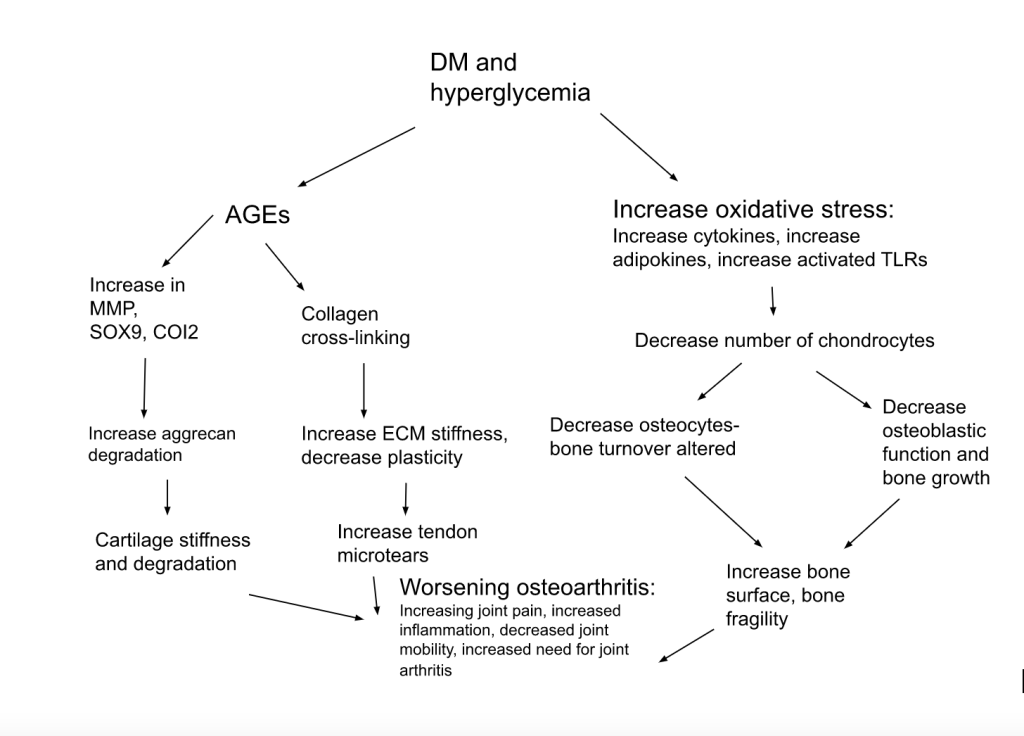Tag: Diabetes
Access to Diabetes Care: World Diabetes Day 2023

Accessing healthcare should be a fundamental human right. However, this isn’t the case for millions of diabetes patients globally. Aiming to overcome the barriers in diabetes healthcare, World Diabetes Day 2023 focuses on the theme ‘Access to Diabetes Care’. Diabetes is a chronic disease that causes health complications and economic hardship, and yet type 2 diabetes is easily managed or […]
Read More… from Access to Diabetes Care: World Diabetes Day 2023
Bringing awareness to the overlap of diabetes and osteoarthritis in American populations

Linked conditions Research has discovered that there is a connection between diabetes and osteoarthritis (OA). Each condition predisposes an individual for the other due to the large overlap between OA and diabetes. A number of similar risk factors, including obesity and age, can lead to the onset of both conditions. In addition, there are a number of overlapping mechanisms such […]
Neuromodulation – the future of diabetes treatments

The treatments for type 2 diabetes are limited in breadth and effectiveness. Medications have side effects, and many patients forget to take their medications regularly. An alternative treatment option that does not require daily compliance could provide better outcomes and is more likely to be used by patients. Dr Jonathan Waataja of ReShape Lifesciences in California, USA and colleagues have […]
Read More… from Neuromodulation – the future of diabetes treatments
Is the magic in the muscle? Targeting skeletal muscle to improve cardiometabolic function in ageing

Dr Joshua T Butcher and his team from the Oklahoma State University College of Veterinary Medicine, USA, investigate the similarities between the co-morbidities associated with obesity and ageing, and specifically how skeletal muscle mass and function can be used to uncouple diseases from accompanying pathology. While we all know that exercise is beneficial for weight loss, an important underlying benefit […]
A new strategy for the treatment of chronic wounds

Wound healing is highly regulated, but oxidative stress (OS) can disturb this healing process in chronic wounds. To better understand the process of initiating chronicity, Dr Manuela Martins-Green and her colleagues at the University of California investigated the impact of increased OS levels on wound healing by stimulating chronic wound development in a diabetic mouse model. The team provides insight […]
Read More… from A new strategy for the treatment of chronic wounds
Shining a spotlight on diabetic retinal detachment

Diabetes mellitus affects millions of people globally. Patients are at risk of associated diseases and often encounter problems with their eyesight. Dr Miguel A Quiroz-Reyes, retina specialist at Oftalmologia Integral ABC, Mexico City, Mexico, set out to investigate the outcomes of diabetic patients with advanced complications of the retina. These patients had developed diabetic macula-off tractional retinal detachment, a known […]
Read More… from Shining a spotlight on diabetic retinal detachment
A new method to predict adult-onset type 1 diabetes

Adult-onset type 1 diabetes is an autoimmune disease often mistaken for type 2 diabetes. Distinguishing adult-onset type 1 diabetes from type 2 diabetes is vital so that appropriate treatment can begin immediately. This is mainly achieved by identification of GADA, an islet autoantibody found in patients with adult-onset type 1 diabetes. A radio-binding assay is currently used for GADA detection, […]
Read More… from A new method to predict adult-onset type 1 diabetes
Maryland Stem Cell Research Fund: Cutting-edge regenerative medicine

The Maryland Stem Cell Research Fund (MCSRF) is devoted to developing and supporting innovative research into all aspects of stem-cell-based technologies. Through its diverse program structure, the MSCRF is intimately involved in every stage of the stem cell journey – from pre-clinical lab discovery to clinical patient trials. Importantly, it remains forward thinking, ensuring the next generation of researchers have […]
Read More… from Maryland Stem Cell Research Fund: Cutting-edge regenerative medicine
An age-old problem: How SENS Research Foundation is looking at age-related disease in a new way

Despite time, energy and money being poured into age-related disease research around the world, humans are yet to find cures for illnesses such as Alzheimer’s, cardiovascular disease and diabetes. SENS Research Foundation believe this is because current research is approaching the problem from the wrong angle. Research Outreach found out more from the Foundation’s Chief Science Officer and co-founder Dr […]
Timely insulin therapy to treat type 2 diabetes

Diabetes is a tricky condition to treat. While insulin can efficiently lower blood sugar levels and protect pancreatic ꞵ-cells, it can also cause harmful side effects such as hypoglycaemia and weight gain. Severe hypoglycaemia may trigger arrhythmias and cardiovascular events. Professor Markolf Hanefeld suggests that an individualised approach to start timely insulin therapy on the basis of risk/benefit balance is […]
Read More… from Timely insulin therapy to treat type 2 diabetes